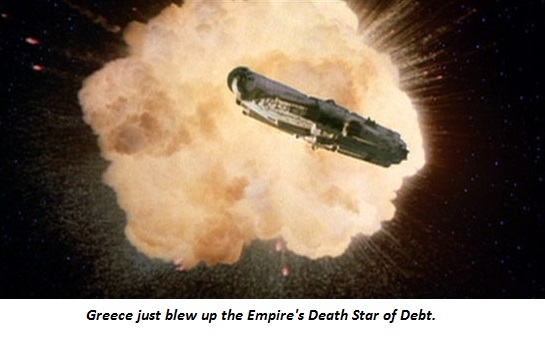Greece has the potential to be the small domino that ends up toppling much larger dominoes.
A number of readers pointed out difficulties with my suggestion that Greece adopt the U.S. dollar (USD), the primary one (as pointed out by Tyler Durden) being that Greece needs a weak currency for its re-set, not one that's strengthening.
Others pointed out the unlikelihood of the Left-leaning leadership of Greece adopting the USD.
Still others questioned the foreign-exchange (FX) mechanics of such a currency swap.
Here is a preliminary semi-random list of thoughts on Greece's exit from the euro.
1. I make no claim to expertise in this matter--but I don't think there are any experts in this, as there is no real analog in recent history.
2. This lack of analog (a nation with a small population and GDP leaving or being ejected from a much larger currency union) undermines all references to historical examples.
3. No offense intended to the hardworking people of Greece, but the population and GDP (gross domestic product) of Greece is quite small. Greece's population is 11 million and its GDP is about $240 billion. The modest scale of Greece also undermines any analysis or projection based on historic precedents involving much larger economies.
The European Union has over 500 million residents. Greece's population represents 2.2% of the EU populace.
Ecuador, which uses the US dollar as its currency, has 15 million people.
Los Angeles County, with slightly more than 10 million residents, has a GDP of $554 billion, more than double that of Greece.
4. A sovereign currency reflects not just the interest rate paid on its bonds, but on a host of other factors: fiscal and trade deficits/surpluses, currency pegs, national income, the vibrancy and resilience of the economy, the ability of the central state to manage the economy, private bank credit, transparency, costs of corruption, ease of doing business, how foreign investment capital is treated, the skill levels of its workforce and so on.
5. Thus the Grexit discussion of currencies leads directly to all the larger questions of the Greek economy, political order and society.
In other words, Greece faces not just a debt and currency crisis, but a systemic crisis of its social and political order, its machinery of governance, the legitimacy of its system of taxation and the flexibility of its economy. The currency and debt crises are reflections of these much deeper crises.
These include:
-- Does the structure of Greece's government lend itself to fragile coalitions that are incapable of implementing tough reforms?
-- The need to modernize the practical machinery of governance: record-keeping, taxation policies, transparency, processing of permits and other regulatory necessities, etc.
-- Does the central state have the wherewithal to effectively remake the culture to eliminate corruption as the default setting in the economy?
6. All other things being equal, a nation with a weak but stable currency that makes all imports costly to its residents invites investment in producing more goods and services locally. The keys to being attractive to long-term investment of foreign capital are:
-- A stable currency
-- A central state that isn't going to nationalize the investment the next election cycle
-- A stable, transparent regulatory and permit system
-- A stable, transparent system of taxation
7. Some readers suggested Greece could peg a new drachma currency to the U.S. dollar as a means of establishing much-needed stability. The key to any peg's sustainability is setting the peg low enough that the market won't force the central bank to defend the peg, which is what triggered the Asian Contagion Crisis of the late 1990s.
The nation establishing the peg must also avoid overborrowing, in essence free-riding the stability established by the peg, which is what brought down Argentina's dollar peg in the early 2000s.
8. The Greek people have a simple choice: "do whatever it takes" to stay in the euro, which means living with austerity for decades to come, or leave the euro. It's that simple. The majority of Greeks supposedly want to stay in the euro, but they must come to grips with the reality that the euro is a plutonium life preserver. It's one or the other: permanent austerity as the cost of keeping the euro or no austerity and no euro. You can't have it both ways.
9. Though the mainstream financial media is running a full-court propaganda campaign promoting the idea that "Greece doesn't matter any more," the much-feared reality is that Greece has the potential to be the small domino that ends up toppling much larger dominoes:
Of related interest:
Although the financial media is blathering about negotiations and gamesmanship, the truth is Greece just blew up the Empire's Death Star of debt. There's nothing left to negotiate except the official admission that the Imperial Death Star of debt, the most fearsome threat in the galaxy, has been blown to smithereens.

Get a Job, Build a Real Career and Defy a Bewildering Economy(Kindle, $9.95)(print, $20)

Are you like me? Ever since my first summer job decades ago, I've been chasing financial security. Not win-the-lottery, Bill Gates riches (although it would be nice!), but simply a feeling of financial control. I want my financial worries to if not disappear at least be manageable and comprehensible. And like most of you, the way I've moved toward my goal has always hinged not just on having a job but a career.
You don't have to be a financial blogger to know that "having a job" and "having a career" do not mean the same thing today as they did when I first started swinging a hammer for a paycheck.
Even the basic concept "getting a job" has changed so radically that jobs--getting and keeping them, and the perceived lack of them--is the number one financial topic among friends, family and for that matter, complete strangers.
So I sat down and wrote this book: Get a Job, Build a Real Career and Defy a Bewildering Economy.
It details everything I've verified about employment and the economy, and lays out an action plan to get you employed.
I am proud of this book. It is the culmination of both my practical work experiences and my financial analysis, and it is a useful, practical, and clarifying read.
Test drive the first section and see for yourself. Kindle, $9.95 print, $20
"I want to thank you for creating your book Get a Job, Build a Real Career and Defy a Bewildering Economy. It is rare to find a person with a mind like yours, who can take a holistic systems view of things without being captured by specific perspectives or agendas. Your contribution to humanity is much appreciated."
Laura Y.
Gordon Long and I discuss The New Nature of Work: Jobs, Occupations & Careers(25 minutes, YouTube)
NOTE: Contributions/subscriptions are acknowledged in the order received. Your name and email remain confidential and will not be given to any other individual, company or agency.
| Thank you, Kristen B. ($25), for your gloriously generous contribution to this site-- I am greatly honored by your support and readership. |
|





























